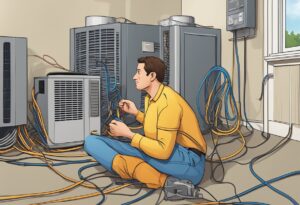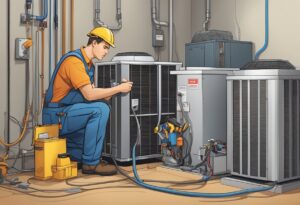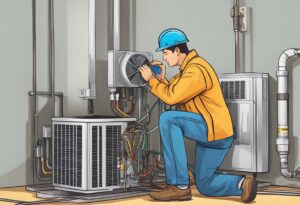DIY projects have become increasingly popular in recent years, with many people opting to tackle home improvement tasks themselves instead of hiring professionals. While this can save money and provide a sense of accomplishment, there are certain tasks that should not be attempted without proper training and expertise. One of these tasks is HVAC installation.

Installing a heating, ventilation, and air conditioning (HVAC) system is a complex process that requires specialized knowledge and equipment. While it may be tempting to try to install a new HVAC system yourself to save money, doing so can be risky and potentially dangerous. In this article, we will explore the risks of DIY HVAC installation and explain why it is important to trust a professional for this task.
Understanding HVAC Systems

Components and Functionality
An HVAC system is a complex system that is responsible for heating, ventilation, and air conditioning in a building. The system consists of several components that work together to regulate the temperature and air quality in a building.
The main components of an HVAC system include a furnace or heat pump, an air conditioner, ductwork, and a thermostat. The furnace or heat pump is responsible for heating the air, while the air conditioner cools the air. The ductwork is used to distribute the heated or cooled air throughout the building, and the thermostat is used to regulate the temperature.
Other components of an HVAC system include air filters, humidifiers, and dehumidifiers. Air filters help to remove dust, allergens, and other particles from the air, while humidifiers and dehumidifiers help to regulate the humidity levels in a building.
Common Types of HVAC Systems
There are several types of HVAC systems, including central air conditioning systems, heat pumps, and ductless mini-split systems.
Central air conditioning systems are the most common type of HVAC system in the United States. These systems use ductwork to distribute cooled air throughout a building. Heat pumps are another common type of HVAC system that can be used for both heating and cooling. Heat pumps work by transferring heat from the air outside to the air inside the building.
Ductless mini-split systems are another type of HVAC system that is becoming increasingly popular. These systems do not require ductwork and are ideal for buildings where installing ductwork is not feasible.
In conclusion, understanding the components and functionality of an HVAC system is important when considering a DIY installation. It is crucial to have a clear understanding of the different types of HVAC systems available, as well as their pros and cons, before attempting to install one. It is always recommended to trust a professional for HVAC installation to avoid any potential risks.
Potential Risks of DIY Installation

Safety Hazards
DIY HVAC installation can pose significant safety risks to individuals who are not properly trained or equipped with the necessary tools and knowledge. HVAC systems involve electrical and gas components that can be dangerous if mishandled. Improper handling of these components can lead to electrocution, gas leaks, and fires, which can be life-threatening.
Improper Installation Consequences
Improper installation can lead to a host of problems that can affect the performance and efficiency of the HVAC system. For instance, incorrect sizing of the system can result in inadequate heating or cooling, leading to discomfort and higher energy bills. Poorly installed ductwork can cause air leakage, leading to reduced efficiency and poor indoor air quality. In addition, improper installation can cause premature equipment failure, resulting in costly repairs or replacement.
Voiding Warranties
DIY installation can void the manufacturer’s warranty and leave the homeowner responsible for any damages or repairs. Most HVAC manufacturers require professional installation to ensure that the system is installed correctly and to prevent any future problems. Homeowners who attempt DIY installation risk losing their warranties and may end up paying for costly repairs out of pocket.
Overall, DIY HVAC installation poses significant risks and can lead to costly mistakes. It is important to trust a professional to ensure that the system is installed correctly and safely.
The Importance of Professional Expertise
When it comes to HVAC installation, it’s important to trust a professional with the job. Here are a few reasons why:
Certifications and Training
HVAC professionals have undergone extensive training and earned certifications to ensure that they have the knowledge and skills necessary to install and maintain HVAC systems. These certifications require passing rigorous exams and ongoing education to maintain their expertise. By hiring a professional, you can be confident that they have the necessary training and knowledge to complete the job safely and effectively.
Experience and Knowledge
In addition to certifications and training, HVAC professionals have years of experience working with different types of HVAC systems. They have encountered a wide range of problems and know how to troubleshoot and solve them efficiently. With their experience and knowledge, they can provide expert advice on the best HVAC system for your home and ensure that it is installed correctly and functioning at its best.
Access to Specialized Tools
HVAC professionals have access to specialized tools that are necessary for HVAC installation. These tools can be expensive and difficult to obtain for the average homeowner. By hiring a professional, you can be sure that they have the necessary tools to complete the job safely and efficiently.
Overall, the importance of professional expertise in HVAC installation cannot be overstated. By hiring a professional, you can be confident that your HVAC system is installed correctly, functioning efficiently, and will provide optimal comfort for your home.
Economic Considerations
Long-Term Costs of DIY
While DIY HVAC installation may seem like a cost-effective option at first, it can actually end up costing homeowners more in the long run. Improper installation can lead to inefficiencies, which can result in higher energy bills. Additionally, DIY installation may void the manufacturer’s warranty, leaving homeowners responsible for costly repairs and replacements.
Resale Value Impact
Homeowners who choose to install their HVAC system themselves may also face negative impacts on their home’s resale value. Buyers may be hesitant to purchase a home with a DIY-installed HVAC system, as they may be concerned about the quality of the installation and potential future issues. This can lead to lower offers and longer time on the market.
Insurance Implications
DIY HVAC installation may also have insurance implications. If an improperly installed system causes damage to the home or injures someone, the homeowner may be held liable. Insurance policies may not cover damage or injuries resulting from DIY installation, leaving homeowners responsible for costly repairs and medical bills.
Overall, while DIY HVAC installation may seem like a cost-effective option, it can actually end up costing homeowners more in the long run. Homeowners should trust a professional for their HVAC installation needs to ensure proper installation, avoid negative impacts on resale value, and mitigate insurance implications.
Legal and Regulatory Compliance
Building Codes
When it comes to HVAC installation, there are strict building codes that must be followed. These codes are in place to ensure that the system is installed safely and properly. Failure to comply with these codes can result in fines, legal action, and even the need to remove and reinstall the system.
A professional HVAC technician is trained to understand and comply with these codes. They will ensure that the system is installed correctly, and that all necessary permits and inspections are obtained. This will give you peace of mind knowing that your system is safe and legal.
Permits and Inspections
In addition to building codes, there are also permits and inspections that are required for HVAC installation. These permits and inspections are typically handled by the local government or building department.
A professional HVAC technician will handle all of the necessary permits and inspections for you. They will ensure that all paperwork is filed correctly and that all inspections are passed. This will save you time and hassle, and ensure that your system is installed legally and safely.
In summary, attempting a DIY HVAC installation can result in legal and regulatory issues. Building codes must be followed, and permits and inspections must be obtained. It is best to trust a professional HVAC technician to handle these tasks for you, ensuring that your system is installed safely and legally.
Environmental and Health Concerns
Refrigerant Handling
One of the biggest concerns when it comes to DIY HVAC installation is the handling of refrigerants. Refrigerants are chemicals that are used in air conditioning units to cool the air. These chemicals can be harmful to both the environment and human health if they are not handled properly.
Refrigerants can cause damage to the ozone layer if they are released into the atmosphere. This can lead to global warming and other environmental problems. In addition, refrigerants can also be harmful to human health if they are inhaled or come into contact with skin.
Professional HVAC technicians are trained to handle refrigerants safely and dispose of them properly. They have the necessary equipment and knowledge to prevent leaks and ensure that the refrigerant is handled in a way that is safe for both the environment and human health.
Energy Efficiency Standards
Another important concern when it comes to DIY HVAC installation is energy efficiency. HVAC systems that are not installed properly can be inefficient and waste energy. This not only increases energy bills but also contributes to environmental problems.
Professional HVAC technicians are trained to install HVAC systems in a way that maximizes energy efficiency. They can ensure that the system is properly sized for the space, that the ductwork is installed correctly, and that the system is properly sealed and insulated. This can help to reduce energy waste and lower energy bills.
In addition, professional HVAC technicians can also help homeowners to choose HVAC systems that are energy efficient and meet industry standards. They can provide advice on the best systems for the space and help homeowners to select systems that are environmentally friendly and cost-effective.

0 Comments